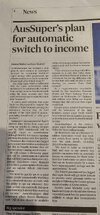- Joined
- 20 July 2021
- Posts
- 12,066
- Reactions
- 16,791
damned ( or doomed) if you listen to a politician is my opinionOn one hand, retired people are criticised for spending all their money and going on the pension and then the next pollie says you should spend it all before you die.
Most people do Not know when they are going to die or if they are going to get sick next year or who knows what else might happen?
Damned if you do and damned if you don't, so it seems to me
be greedy .. think for yourself


